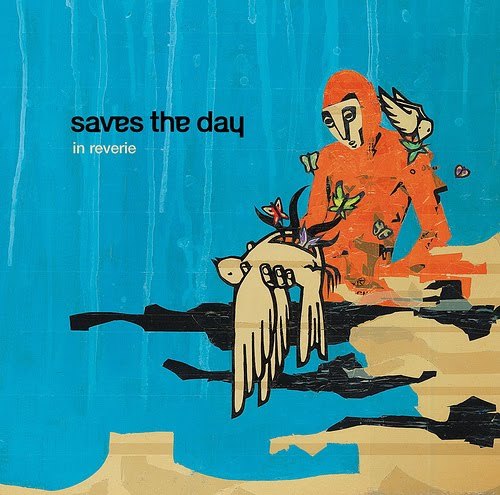Saves The Day - In Reverie

In 2003, Saves The Day were approaching a plateau. Commercially peaking, off of the back of 1999’s hyper-active ‘Through Being Cool’ and 2001’s more considered, but still bouncy 'Stay What You Are’, the band had been picked up by Dreamworks for their fourth full-length.
From a listener perspective, it appears that Chris Conley saw this as an opportunity to continue to expand the band’s sound. Originally rooted in energetic emo/hardcore, the songs on SWYA had seen more emphasis placed on melody and less on break-neck speed and power, while keeping the often explicit, violent lyrical matter intact.
Using that record as a jump-off point, and his newly-found Beatles obsession as a compass, Conley swan-dives into the deep blue on 'In Reverie’. He condenses long, winding melodies and progressive chord sequences into each of the twelve tracks, realising that complexity need not be at the expense of economy (only one track makes it past the 3:30 mark). Weezer had taken a similar stance on 2001’s Green Album: Deft, Fabs-style melodies backed by heavy, layered guitars. But wheras 'Green’ could be seen as an efficient, compressed regression from 'Pinkerton’, 'In Reverie’ is an album laced with ambition. Musically, this was by far their most interesting work and is indicitive of a confident band and it’s leader determinedly looking forward.
More pleasing is discovering that STD’s standard traits are not sacrificed. In fact, Conley’s mood is often darker and more subversive than before. As if admitting, over the swinging, swaying chorus of 'Anywhere With You’, that that’s just where he’d rather not be isn’t enough of a clue from the off.
The proceeding imagery is by turns stark, grotesque and desperate. Never more so than on the album’s centerpiece, the withering, cynical 'Monkey’, with it’s allusions to absolute personal breakdown and submission. However, as the title suggests, a certain amount of 'In Reverie’ is given over to being lost in one’s own thoughts, wandering in a dream-like state. At the tender age of 23, it appears that Conley is burnt out and sickened by the world around him. He is longing to lose himself in memories and escape to an imaginary world - one where, perhaps, the titular object from 'She’ exists/existed - 'Forever flowing, unfolding’
Although 'In Reverie’ became STD’s highest charting album in the US, label support was not forthcoming (Dreamworks became part of Interscope, who weren’t interested in the record) and the group were quickly and unceremoniously dropped - casting their fledgling release into the commercial abyss.
Not only that, but the record was, initially at least, rejected by hardcore fans who were not on board with a new pop-centric, 'mellow’ direction and, particularly, what was perceived as a degradation of Conley’s singing style. Some of the haters would come round in later years and see the release for what it is: A snapshot of a young man at the beginning of the 21st century at odds with the modern world, wishing to see the beauty in everything around him, but more often than not so repulsed he retreats into a peverse fantasy world.
It is also Saves The Day’s best album.
In the aftermath, Conley’ outlook would get considerably worse (a return to Vagrant Records for 2005’s borderline mentally-disturbed, aggressive, pretty awesome 'Head For The Hills’) before it eventually got better (2011’s expansive 'Daybreak’), but never again would it get quite so introspective. The trilogy of albums that followed were promoted as a concept (Fall/Reflection/Rise) and, if that is the case, 'In Reverie’ fits snugly as the pre-emptive strike; the realisation and grim acceptance of impending fate.
Monkey: http://youtu.be/Pc2ryRmcTy0
Buy the record: http://www.amazon.co.uk/In-Reverie-Saves-Day/dp/B0000C17KK